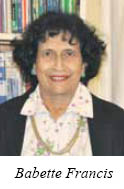The widows of Kandmahal: anti-Christian violence in India
Babette Francis, AD 2000, February 2013

I have a cousin in South Carolina, USA. Actually, I have cousins in countries and cities all over the world - that's the advantage of being born Indian with over a billion fellow countrymen and women - one has a high probability of finding a cousin or the friend of a cousin wherever one goes, except possibly in Antarctica.
I didn't know I had a cousin, Rita Larrivee, in the diocese of Charleston, South Carolina, until she got in touch with me and asked me to help publicise the plight of the widows of Kandhamal in the Indian state of Orissa.
Widows' plight
David Griffiths, South East Asia Team leader for a human rights NGO specialising in freedom of religion, has written a moving article in the Huffington Postabout the plight of the widows of men killed in the anti-Christian violence provoked by radical Hindus:
"Asmita's husband Rajesh was buried alive in a muddy riverbank in the remote Kandhamal district of Orissa four years ago. He is not enumerated in the death toll of the anti-Christian pogrom which began in August 2008, because police did not find his body. In fact, they did not look for it. Asmita has no death certificate, because you don't get one here if the body hasn't been found and identified.
She doesn't get a widow's pension since, officially, she isn't a widow. She has sent her two young daughters to hostels for their safety and education ...
"Other widows of the 2008 violence have equally desolate stories. Their husbands are among over 90 killed during the wave of anti-Christian attacks that followed the assassination of local radical Hindu nationalist leader, Swami Lakshmananda Saraswati, by Maoist insurgents. One widow said her husband was cut up and burnt inside a church, and the case was never brought to trial. Another, whose husband was murdered inside the church he oversaw, said her future was simply 'full of sorrow'.
"The sting is in the miserable failure of the justice system - Catholic Archbishop Raphael Cheenath started writing letters to the state government in the 1970s, warning that sporadic episodes of targeted violence against Christians in his diocese were building up to something bigger and urging justice be done to safeguard against this. His warnings were tragically vindicated. The 2008 violence was devastating - many of the 90 who were murdered died in terrible circumstances, and over 56,000 fled from their destroyed homes. But hundreds of complaints were never filed properly by police. Of those that were filed, many more - such as Asmita's - received cursory investigation and did not result in conviction ...
"Hope has not flickered away entirely, thanks to human rights activists who help keep it alive among the victims. An appeal to the Supreme Court is being prepared, to re-open over 30 murder cases which were dismissed without proper investigation. The National Human Rights Commission has been approached to secure a comprehensive package of compensation more in line with that which victims of 1984 anti-Sikh violence and 2002 anti-Muslim violence eventually received ...
"Nobody, though, has a deeper resolve than the widows on behalf of their children - that they will live lives of freedom and security, and honour the memory of their fathers. But for that to happen, they will need all the help they can get. Is anyone listening?"
This is where my cousin Rita Larrivee comes in: a member of St Mary's Church in Greenville, she has spearheaded a fund-raising effort to purchase livestock and vegetable seeds so the women can feed their families, pay tuition at Catholic boarding schools and help young people to learn trades.
Rita learned about the widows' plight from a television news story. Initially, she worked only with family members and close friends to raise money for the women. Then, in late 2011, she went public with her effort, which she calls simply the Orissa Widows Fund, and since then has been touched by the responses. She has received donations from individuals and parish groups from around the state.
"The widows are very happy because their children are being sent to school, and the older children are learning trades like nursing, dress-making and truck-driving," Rita said. "Altogether it's been amazing to do this work, and the generosity has been wonderful. People who have written to me with donations say they're glad to support their brothers and sisters because they are being persecuted. This has made people more aware of persecution of Christians worldwide."
Self-help groups
Rita Larrivee is not alone in her efforts. Father Richard Vaz of the Divine Word Missionaries helps collect and distribute funds while in India, nuns from the Sisters of St Joseph of Annecy and the Sisters of the Daughters of the Cross work directly with the widows and their families.
The nuns have organised self-help groups, where women learn skills such as basic budgeting and accounting, animal care, farming and nutrition, and how to run a small business with the help of microloans. Donations have helped the nuns purchase turmeric, a spice that the women grind and sell in nearby villages. They also lease tracts of land to plant and harvest peanuts and tomatoes.
"The big thing I've learned is to trust in God, because He will provide," Rita says. "When the coffers have been empty, the next day a cheque will arrive. I really feel the power of the Holy Spirit in what we are doing."
Babette Francis, B.Sc. (Hons), is national
coordinator of Endeavour Forum Inc.
